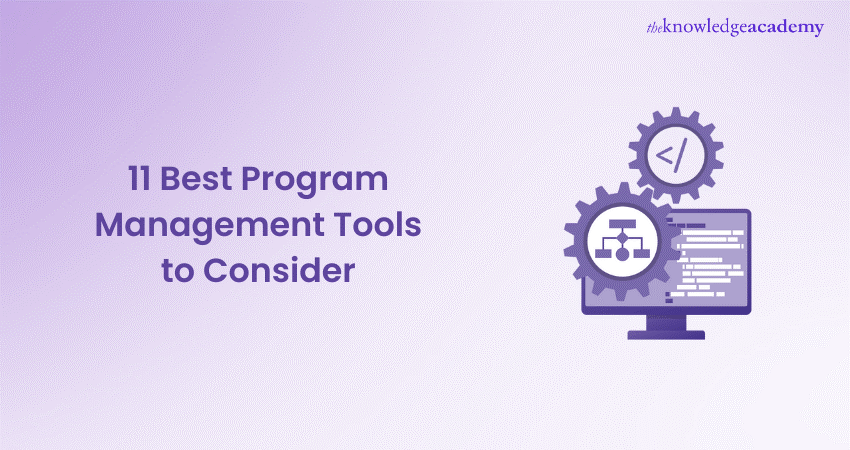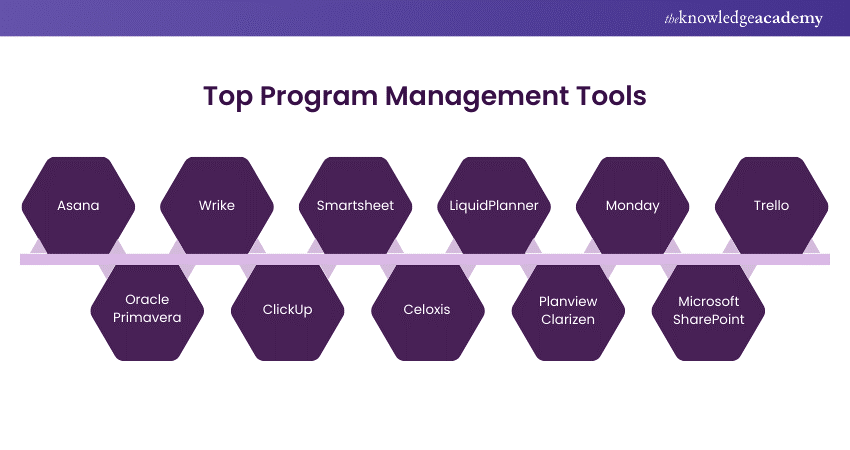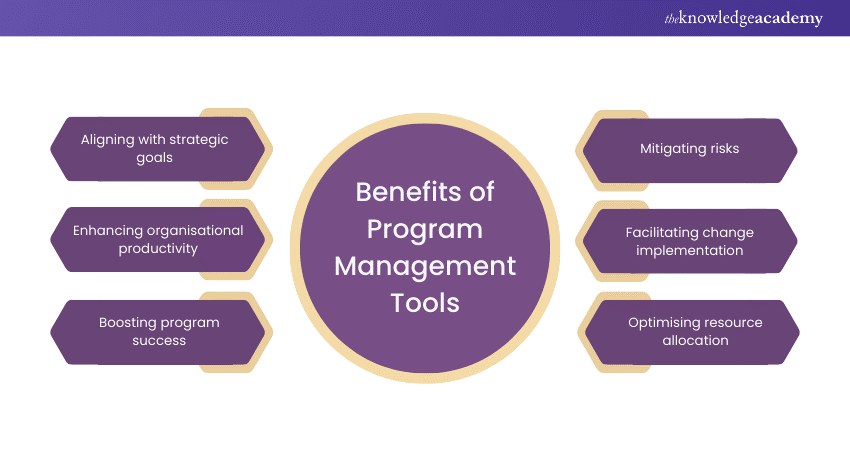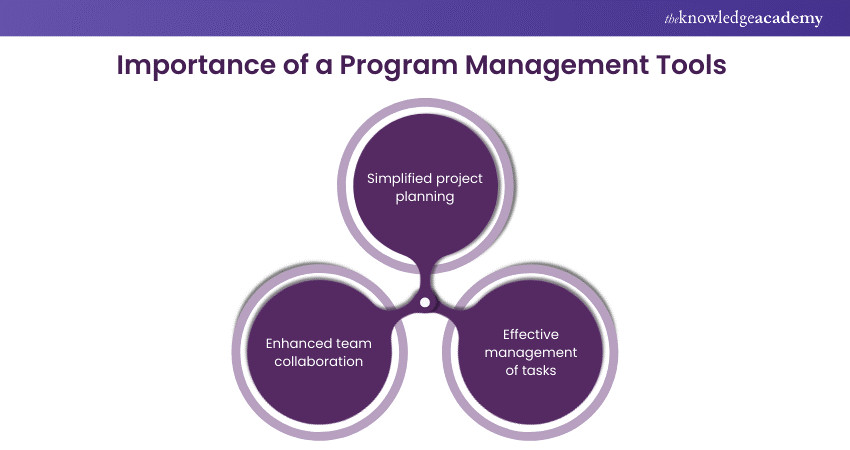We may not have the course you’re looking for. If you enquire or give us a call on +61 272026926 and speak to our training experts, we may still be able to help with your training requirements.
Training Outcomes Within Your Budget!
We ensure quality, budget-alignment, and timely delivery by our expert instructors.

In today's highly dynamic business environment where organisations are trying to achieve their strategic objectives and compete effectively, the key component is highly effective Program Management. Program Management Tools have played a crucial role, which is to use them effectively to overcome all difficulties in project realisation. These programs provide facilities for task coordination, planning of work process and other features which embrace working process and problem solving.
In this blog we will explore the 11 Best Program Management Tools to consider for a better and efficient functioning of the business.
Table of Contents
1) What are Program Management Tools?
2) Benefits of Program Management Tools
3) The importance of a Program Management Tool
4) Conclusion
What are Program Management Tools?

Program Management Tools are high-powered workflow tools with in-built functionalities for process monitoring and coordination. Forming current command centers, they consolidate project data, communication, as well as collaboration. These tools are not just for mere task management wherein they offer strategic planning, resource distribution, tracking processes, and prevention of problems.
They stand for alignment and the sharing of a common goal dedicated to the success of an organisation. Program Management Tools that are scalable and adaptive can handle different project needs. They give organisations the capability to adapt to the complexity as fast as possible, asserting efficiency and accountability. In fact, these tools represent a revolutionary style of Project Management, that employs technology to stimulate innovation and success.
1) Asana
Among the many new-age project management tools nowadays, Asana is bringing a new wave of transformation with a whole new approach to team collaboration, task management and progress monitoring. The user-friendly and rich feature set of Asana provides the team with the opportunity to become more streamlined in their workflows, as well as improve their results when executing projects.
Above all, Asana is the most powerful tool for task management because it features a dynamic platform with functions that facilitate the creation, assignment, and prioritisation of tasks. Its boards, lists and timelines with different project methodologies like agile sprints and traditional planning approaches are customisable and provide flexibility to the user.
In addition, the service's commenting, file attachment, and real-time update features make collaborations effortless. Team members can organise, communicate, share documents, and provide feedback while managing the task.
2) Oracle Primavera
Oracle Primavera is the pillar on which project management at an enterprise-level is based. It is comprehensive in functionality, designed to meet the challenges of large projects. Being known for its sustainable infrastructure and scalability, Primavera performs all the functions that organisations need to achieve their project goals with accuracy and ease.
The base of Primavera is in its advanced plan and scheduling functions, which facilitate the creation of complex planning, the identifying of the critical path, and, later, the optimisation of the resource allocation. Its portfolio management functions allow us to take control over projects and prioritise them, perform a distribution of sources rationally, and keep track of many initiatives simultaneously.
Additionally, Primavera's in-depth reporting and analytical tools enable decision-makers to get informed about project advancement, issue resolution, and threats management. Being the integration point between Oracle solutions and third-party applications, Primavera provides cohesion and consolidation of the whole project management area.
3) Wrike
Wrike acts as the embodiment of innovation as far as project management is concerned, and that is demonstrated by an advanced collaborative platform which is designed for improving productivity and project management. Armed with its user-friendly interface and rich set of features, Wrike teams can overcome obstacles, provide a seamless collaboration and accomplish the processes much faster.
At the core of Wrike, there is Wrike Team, which offers flexible project management tools, allowing to create tasks, assign responsibilities, and check progress in real time. It provides valuable data in dashboards that track the schedule, Gantt Charts, and resources assignment.
Furthermore, Wrike promotes seamless cooperation with the help of such things as @mentions, file sharing, and real-time updates. Teams can have the right interactions, can give each other feedback and refine their projects.
4) ClickUp
ClickUp becomes a game-changer in the sea of project management, being a flexible platform that has been created with an ambition of changing how tasks are organised, collaboration is performed, and productivity has been enhanced. Through its multifunctionality and user-friendly design ClickUp gives teams the opportunity to reduce workflows and enhance processes, thereby improving success rates of projects.
What ClickUp is all about at the end of the day is a task management system that is flexible, and through it, you can effortlessly add tasks, assign responsibilities, and give a deadline. Its customised views which can be seen as lists, boards, and calendars, matches different project management strategies according to the deviations of teams, enhancing the incorporation of varying team preferences.
Besides, ClickUp enables connection-free collaboration through functions like comments, mentions, and document sharing. Teams can exchange well communication, give feedback, and revise tasks in real time from the platform.
5) Smartsheet
Smartsheet is the dynamic and multifaceted project management tool of choice for teams in different verticals, spanning across all the major industry sectors. Through Smartsheet's user-friendly interface and an array of tools, organisations are enabled to seamlessly manage projects while maintaining the necessary accuracy and effectiveness.
First of all, Smartsheet is a complete management tool which offers a wide range of functions for managing tasks. The latter can be created, assigned and tracked on the go. It's a much flexible interface with a grid structure and various templates are able to fit different approaches, from the waterfall to the agile way.
Also, Smartsheet enhances collaboration and transparency by engaging attributes like comments, file attachments, and auto alerts. Teams can collaboratively, communicate, share resources, and track progress easily because of the platform.
6) Celoxis
Celoxis is an integrated and robust Project Management Software that possesses a package of features that are useful for planning, execution, and monitoring projects respectively. Regarded as offering flexibility and scalability, Celoxis gives businesses a competitive edge while improving productivity.
To say the least, Celoxis offers sophisticated project planning features enabling creation of comprehensive project schedules and timeframes, setting up milestones, and distribution of resources effectively. It features an efficient user interface that accommodates varying management approaches, from Waterfall to Agile.
Similarly, Celoxis promotes teamwork and communication by adding functionalities including discussion threads, document sharing and real-time updates. Through teams can work together, exchange information and monitor their progress in a comprehensive manner within the system.
7) LiquidPlanner
LiquidPlanner becomes flexible and innovative project management software which can provide the level of services needed by modern teams. Celebrated for its agile and intuitive scheduling engine as well as its effective collaboration support, LiquidPlanner provides organisations with the ability to respond successfully to complex tasks.
At its heart, LiquidPlanner has sophisticated scheduling tools that permit users to create realistic project activity plans, prioritising the tasks and executing them at the changing priorities dynamically. Its distinctive point of view to scheduling — that is, predicted ranges and probability forecasting — make it possible for teams to manage uncertainties successfully.
Moreover, LiquidPlanner facilitates collaboration and transparency via components such as comments, document sharing, and team dashboard. The platform features the team's ability to communicate effectively, exchange information and keep track of progress concurrently.
Improve your managerial skills through our Certified Global Project Manager (CGPM).
8) Planview Clarizen
Planview Clarizen has already left a mark of excellence and climbed to the top of the ladder as a project management solution, providing an array of features to match the diverse requirements of businesses from everywhere. Known for its sophisticated features and expandability, Clarizen gives teams the vital tools to plan, perform and control any project with the utmost accuracy and speed.
At the heart of Clarizen, lies a powerful platform that gives the tools of advanced project planning and Portfolio Management. Users can build detailed project plans, allocate resources strategically and monitor performance across multiple projects. It has an easy-to-use interface and workflows can be customised for various project management methodologies - from classical waterfall processes to agile approaches.
In the end, Clarizen collaborates through channels such as discussion forums, document sharing and real time updates for transparency. The teams can connect freely, exchange ideas and information and track progress in one place – the platform itself.
9) Monday
Monday.com is an innovative and flexible platform that uses teams and projects as tools for the redesign of the whole collaborative work. The reputation of Monday.com precedes it, with its user-friendly interface and customisable workflows that enable teams to improve processes, enhance productivity, and achieve project success without hassle.
Working on a core level, Monday.com offers visual management and an intuitive interface which make it easy for users to generate tasks, assign responsibilities and track progress. It has a number of built-in boards, timelines, and dashboards that can accommodate varied Project Management Methodologies from agile to classical approaches.
Additionally, it is Monday.com that enhances teamwork and openness through these features which include @mentions, file sharing, and activity logs. Teams of this social media can communicate effectively, sharing the resources and monitoring progress in real-time within the app.
10) Microsoft SharePoint
Microsoft SharePoint is the foundation on which collaboration, content management, and information work come together in a dynamic way, for organisations that need to share and organise information in one place. Well-known for the ability to work well with other Microsoft tools and a lot of other tools such as PowerBI, Word, Excel and Outlook, enables teams to cooperate effectively, optimise workflow and drive productivity.
At its core, SharePoint is an online system, where documents, files, and data can be stored and shared among team members, making it convenient to access and work on content in real-time. The user-friendly nature and customisable options of the interface help the managing of the versions, documents and workflow automation, what ensures originality and consistency in information management.
For further, SharePoint encourages communication and collaboration through team sites, discussion boards and alerts. Teams can interact smartly, share their ideas, and be aware of the stage at which the project is by using the platform as medium.
11) Trello
Trello captured the fundamentals of how simple and efficient task management and team collaboration can be. Quite well known for its user-friendly interface and visual approach to project organisation, Trello enables teams to make quick adjustments to workflows, find top task priorities and ultimately achieve project success in a hassle-free manner.
At its base level, Trello gives a flexible system to annotate tasks onto boards, lists, and cards allowing the user to map the workflow and track progress with just but a glance. It's simple intuitive drag-and-drop interface and numerous customisable features that allow for seamless creation, assignment and follow up of tasks.
In terms of collaboration, Trello features such as comments, attachments, and activity logs help create transparency. Teams benefit from smooth communication, sharing resources and working on tasks which can be accomplished in real-time within the browser.
Benefits of Program Management Tools

1) Aligning with strategic goals
It is vital that all projects built towards strategic goals responsible lead to successful achievement of objectives. By choosing projects which are in line with the strategic plans, teams can achieve more and see observable positive impact on business. This establishes coherence, concentration, and project management roles throughout the project duration period. It lets us determine the most significant actions which bring high value and redundancy to future organisation plans.
2) Enhancing organisational productivity
The importance of organisational productivity to being competitive and to attaining sustainable success must be emphasised. Through this system, processes will be improved, resources used more efficiently, and technology deployed to make operations more productive. This is accomplished through building a climate of non-stop improvement, equipping employees with the right instruments and training, and tailoring the procedures to meet the strategic objectives. High performance helps to generate more production, better effectiveness and finally, better revenues.
3) Boosting program success
The performance of a program can often determine whether an organisation will provide an industry-beating output or else fall short in delivering excellent results. It relies on techniques such as creating efficient strategies, leveraging partnerships, and managing projects. Through a set of goals, identifying key performance indicators and efficiently controlling progress, teams may be able to ensure project alignment and risk reduction.
4) Mitigating risks
Risk Management is of paramount importance in assuring and improving project sustainability. Therefore, a successful outcome should not be neglected. It requires identifying possible risks, evaluating their impact, and nominating preventive policies to reduce the chances of occurrence or at least minimise their consequences. Through systematically undertaking hazardous assessments, taping contingency plans and tracking risk indicators, teams can overcome hurdles and manage any unexpected events.
5) Facilitating change implementation
Enabling the implementation of change is a chief objective of organisations that operate in changing market conditions and ongoing priorities transformations. It includes the elements of fostering a convenient culture, communication, and stakeholder engagement. Through clarifying the reasoning behind change initiatives, the solicitation of feedback, and providing resources and support, organisations can lessen the magnitude of adjustments and stagnation. Furthermore, we should adopt change management methodologies and use information technology (IT) to make operations simpler and more efficient.
6) Optimising resource allocation
Adequate resource planning plays a key role in the attainment of the long-term goals of an organisation with the end goal of increasing asset worth. It encompasses the identification of resources requirements, assessment of those available and their equitable distribution to priorities and undertakings. Organisations can determine high impact projects, balance workloads, and avoid bottlenecks through data-informed dimensions. Also, using resource management tools and processes reduces the ambiguity in decision-making and harmony in accordance with organisational objectives is made possible.
The importance of a Program Management Tools

1) Simplified project planning
A simplified approach to Project Planning is an early step in establishing a project that will succeed. It is about converting project requirements or activities into manageable tasks, setting definite objectives and setting realistic frameworks. This can be done by dividing a project into smaller and manageable steps that companies can use in place of inefficient planning, hence limiting the chances of feeling overwhelmed. With project management methodologies, including Agile and Waterfall, teams can pick planning strategies that adhere to project dynamics.
2) Enhanced team collaboration
The most important factor of a successful project is the enhanced teamwork, and it helps to synergise and create new ideas among team members. It encompasses a setting in which members can exchange original thoughts, communicate effectively and pull toward common causes. Collaboration instruments like communication platforms or project management software allow teams to save time by coordinating activities, share resources, and synchronise the efforts.
3) Effective management of tasks
Specific management in operations is a foundation for effective workflow efficiency and project success. It shall consist of among others; organising tasks, assigning responsibilities, and tracking progress to achieve the project’s objectives. By using task management tools and methods teams can prioritise tasks, set deadlines, and properly employ resources.
Conclusion
In conclusion, this blog helps us understand the 11 Best Program Management Tools to Consider. Program Management Tools are invaluable resources to modern businesses as they are changing the environment regarding planning, executing and monitoring projects. Through integration with strategic goals, increase in productivity level and reduction of risks, they become vital tools for every organisation that wants to achieve outstanding outcomes.
Similarly, they help in improving the workflow, making planning simpler, and enhance resource allocation. Using these instruments aids organisations to create innovations, adapt to change, and, ultimately, reach their long-range plans. With the rising existing of programs prioritising efficiency and effectiveness, investing in Program Management Tools tends to move from being an option to a necessity for the sustained success of organisations.
Improve your organisational efficiency through our Introduction To Project Management Certification Course!
Frequently Asked Questions

Yes, Jira can handle Program Management with its customisable workflows, issue tracking, and advanced reporting. Plugins like Jira Portfolio extend its capabilities for program-level planning, roadmap visualisation, and dependency management. Careful setup is needed to align with program requirements and scale.

The four types of project management methodologies are:
1) Waterfall: A linear approach with sequential stages.
2) Agile: Iterative and flexible, focusing on delivering value incrementally.
3) Lean: Emphasises efficiency by minimising waste and maximising value.
4) Hybrid: Combines elements of different methodologies to suit specific project needs.

The Knowledge Academy takes global learning to new heights, offering over 30,000 online courses across 490+ locations in 220 countries. This expansive reach ensures accessibility and convenience for learners worldwide.
Alongside our diverse Online Course Catalogue, encompassing 17 major categories, we go the extra mile by providing a plethora of free educational Online Resources like News updates, Blogs, videos, webinars, and interview questions. Tailoring learning experiences further, professionals can maximise value with customisable Course Bundles of TKA.

The Knowledge Academy’s Knowledge Pass, a prepaid voucher, adds another layer of flexibility, allowing course bookings over a 12-month period. Join us on a journey where education knows no bounds.

The Knowledge Academy offers various Project Management Courses, including Introduction to Project Management Course, Project Management Office (PMO) Fundamentals Course and Certified Digital Services Project Manager Course. These courses cater to different skill levels, providing comprehensive insights into Top 9 Project Management Trends: An Overview
Our Project Management Blogs covers a range of topics offering valuable resources, best practices, and industry insights. Whether you are a beginner or looking to advance your Business Improvement skills, The Knowledge Academy's diverse courses and informative blogs have you covered.
Upcoming Project Management Resources Batches & Dates
Date
 PgM (Programme Management) Course
PgM (Programme Management) Course
Fri 10th Jan 2025
Fri 28th Feb 2025
Fri 4th Apr 2025
Fri 16th May 2025
Fri 11th Jul 2025
Fri 19th Sep 2025
Fri 21st Nov 2025







 Top Rated Course
Top Rated Course



 If you wish to make any changes to your course, please
If you wish to make any changes to your course, please


